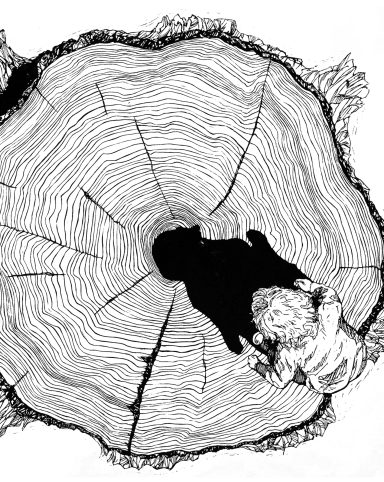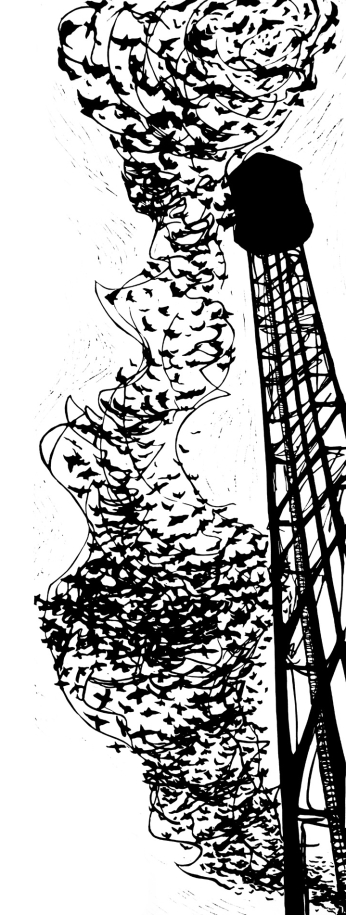To become what we need to each other, and to find power in friendship, is to become dangerous.
–anonymous [1]
I have a circle of friends and family with whom I am radically vulnerable and trust deeply – we call it coevolution through friendship.
–adrienne maree brown [2]
These are not just words; they are clues and prods to earthquakes in kin making that are not limited to Western family apparatuses, heteronormative or not.
–Donna Haraway [3]
Freedom was once inseparable from interdependence, close ties, and kinship: I am free because of others I can depend on. Today, freedom tends to mean something different. It is about being unconstrained and having options. Look for the dictionary definition of freedom today and one finds rights and choices at the core, applied to an isolated individual. From the Oxford English Dictionary:
“The power or right to act, speak, or think as one wants:
‘we do have some freedom of choice’
The state of not being imprisoned or enslaved:
‘the shark thrashed its way to freedom’
The state of not being subject to or affected by (something undesirable):
‘government policies to achieve freedom from want’”[4]
At bottom, all of these definitions are about getting away from external restriction or influence: being unhindered, unaffected, independent. The 17th century philosopher Thomas Hobbes imagined freedom as nothing more than an ‘absence of opposition’ possessed by individuals. For Hobbes, the free man is constantly armed and on guard; “when going to sleep, he locks his doors; when even in his house he locks his chests.”[5] Hobbes imagined a form of life that would become more and more pervasive: an isolated and selfish existence backed by contracts and violence—a vision of freedom fused with exploitation.
 When peasants were ‘freed,’ during Hobbes’ time, it often meant that they had been forced from their lands and their means of subsistence, leaving them free to sell their labor for a wage, or starve. It is no coincidence that this lonely conception of freedom arose at the same time as the European witch trials, the enclosure of common lands, the rise of the transatlantic slave trade, and the colonization and genocide of the Americas. At the same time as the meaning of freedom was divorced from friendship and interdependence, the lived connections between people and places were being dismembered.
When peasants were ‘freed,’ during Hobbes’ time, it often meant that they had been forced from their lands and their means of subsistence, leaving them free to sell their labor for a wage, or starve. It is no coincidence that this lonely conception of freedom arose at the same time as the European witch trials, the enclosure of common lands, the rise of the transatlantic slave trade, and the colonization and genocide of the Americas. At the same time as the meaning of freedom was divorced from friendship and interdependence, the lived connections between people and places were being dismembered.
Over centuries, kinship would be enclosed within the nuclear family, freedom within the individual, and values within morality and law. Together, these enclosures carve out a void for the ‘free individual’ of modern capitalism: a sad and lonely fiction, walled-in by self-interest, and based on the ideal of a healthy, patriarchal, white, rational, property-owning man. This uprooted being sees his rootlessness—his very incapacity to make and sustain transformative connections—as a feat of excellence.
If capitalism works by dismembering transformative relationships, can friendship be revalued as a radical, transformative form of kinship? Maybe the concept of friendship is already too colonized. Under neoliberalism, friendship is a banal affair of private preferences: we hang out, we share hobbies, we make small talk. We become friends with those who are already like us, who keep us comfortable, rather than becoming different and more capable together. The algorithms of Facebook and other social networks shepherd us towards the ceaseless refinement of our profiles, reducing friendship to the click of a button.[6]
This neoliberal friend is the alternative to hetero and homonormative coupling: ‘just friends’ implies a much weaker and insignificant bond than a lover could ever be. In neoliberal friendship, our everyday lives aren’t tangled up together: we don’t really need each other to live. But these insipid tendencies don’t mean that friendships are pointless; only that friendship itself is a terrain of struggle. The dominant order works to usher its subjects into flimsy relationships where nothing is at stake, and to infuse intimacy with violence and domination.
Maybe friendship can be revalued in an expansive but specific way: it could mean friends, chosen family, and other kin, intimately connected in a web of mutual support. This could be a process through which people come to depend on and defend each other. Intersecting currents of disability justice, youth liberation, queer movements, feminism, ecology, anarchism, Indigenous resurgence, and Black liberation have all emphasized the centrality of nurturing strong relationships while destroying toxic ones. Friendship as freedom, in this story, names a dangerous closeness that capitalism works to eradicate through violence, division, management, and incitements to see ourselves as isolated individuals or nuclear family units.
In spite of centuries of colonization and enclosures, the vapid ideal of individual freedom still can’t get a hold on many parts of the world. Even in Europe, where so many tools of colonization were refined, the roots of freedom were different. Centuries ago, some Europeans had a more relational conception of freedom, which wasn’t just about the absence of external constraints, but also about our immersion in the relationships that sustain us and make us thrive.

“Freedom” and “friend” share the same early Indo-European root: *fri, or *pri, meaning “love.”[7] This root made its way into Gothic, Norse, Celtic, Hindi, Russian and German. To be ‘free’ was not to be unrestricted, but to be a friend among loved ones. As The Invisible Committee write in To Our Friends,
“‘Friend’ and ‘free’ in English…come from the same Indo-European root, which conveys the idea of a shared power that grows. Being free and having ties was one and the same thing. I am free because I have ties, because I am linked to a reality greater than me.”[8]
Along with thinkers like Colectivo Situaciones, Eve Sedgwick, Brian Massumi, Lauren Berlant and Sara Ahmed, the Invisible Committee is part of a current of radical thought that is grounded in affect.[9] Often traced to the thought of Baruch Spinoza, affect theory cuts against the grain of the divisions between nature/culture, mind/body, and subject/object that helped birth capitalism. Spinoza’s work remained marginal compared to Descartes and Hobbes, but his relational worldview has been taken up by radicals at the edges of philosophy, ecology, feminism, and marxism and anarchism.[10]
For Spinoza, bodies are not defined by what they are, but by what they do: how they affect and are affected by the forces of the world. In this way, capabilities are not fixed, but constantly shifting. This is a fundamental departure from the inherently ableist and ageist perspective that measures all bodies in relation to the norm of a ‘healthy,’ ‘mature’ or ‘able’ body. It runs against dominant strands of both Western knowledge and morality, which strive for universalism and generalizability: they ask what humans are, what we should do, or what we usually do (and how we can be controlled).
In contrast, an affective perspective starts right from a body’s material specificity, without any intervening norm, attuning us to the singularity and openness of bodies and situations: what are we capable of here and now, together, at this time, in this place amidst the relations in which we are embedded?
Beginning in the middle…friendship will be the soil from which a new politics will emerge…
–Ivan Illich[11]
Affect begins in the middle: amidst our situations, in our neighborhoods, with our own penchants, habits, loves, complicities and connections. There is no individual that comes before the dense network of relations we’re enmeshed in. We are always shaping our worlds, and being shaped by them. Freedom can mean nothing other than the active participation in affect: the expansion of what we’re capable of—what we’re able to feel and do together. In this vein, the Invisible Committee writes:
“freedom isn’t the act of shedding our attachments, but the practical capacity to work on them, to move around in their space, to form or dissolve them…the freedom to uproot oneself has always been a fantasmic freedom. We can’t rid ourselves of what binds us without at the same time losing the very thing to which our forces would be applied.”[12]
Freedom here is not the absence of restriction, but the capacity to become more active in shaping our attachments and situations. This becoming-active is not about controlling things, but about learning to participate in their flow, forming intense bonds through which we become implicated in each others’ struggles and capacities. Similarly, feminist philosopher Donna Haraway has argued that ‘making kin’ across divides of species, nation, gender and other borders is perhaps the most urgent task today.[13] Through friendship or kinship we undo and renew ourselves in potentially radical and dangerous ways. In this sense, freedom is rooted in friendship.
 A story: two friends fold their lives together; they draw new capacities out of each other. They hurt each other, and they work through it, emerging more intertwined than before. They are no longer sure which ideas and mannerisms were ‘their own’ and which belonged to the friend. They know each others’ triggers and tendencies, intimately. One finds himself in trouble, and the other drops everything to help, at great personal risk. But this risk and sacrifice is not because it is morally right, or because they have calculated that it is in their own self-interest. It not even felt as a choice; it is something drawn out of them.
A story: two friends fold their lives together; they draw new capacities out of each other. They hurt each other, and they work through it, emerging more intertwined than before. They are no longer sure which ideas and mannerisms were ‘their own’ and which belonged to the friend. They know each others’ triggers and tendencies, intimately. One finds himself in trouble, and the other drops everything to help, at great personal risk. But this risk and sacrifice is not because it is morally right, or because they have calculated that it is in their own self-interest. It not even felt as a choice; it is something drawn out of them.
By creating relational webs that reinforce the values we aspire to, relationships can help undo violent or depleting patterns ingrained by capitalism and other forces of oppression. Loving relationships can be what allow us to face the things we fear about ourselves. They can help undo the ways that we have internalized notions that we are not good enough, not worthy of love, or that we have to put up with things that deplete us and those we care about. Relationships of mutual support can enable us to see and feel the toxicity of some of our attachments. They can help us to look at our patterns of addiction or depression without shame. Those we love can be our reasons to stay alive when we aren’t sure that we want to. They can help us leave miserable situations by leaping with us into the unknown. Friendships can be the source of our capacity to take risks and fight in new ways.
Rather than isolating us into cliques or enclaves, we believe that close ties of friendship and kinship can enable people to better extend themselves and show solidarity across differences and oppressive divisions. Close friends and loved ones allow us to gripe and vent so that we can be more compassionate and patient with those who don’t know us as well. They can help us process fears and anxieties so that we are better able to trust people and move towards trouble and discomfort. They can sit with us when we inevitably fuck up and flail. In turn, transformative struggle beyond friendship can deepen these bonds and generate new ones.
All this might be akin to what ‘friend’ meant to some of our European ancestors before the witch trials: not just someone to hang out with, but someone whose existence is inseparable from one’s own. A relationship crucial to life, worth fighting for.
The sharp edges of friendship and freedomIf one would have a friend, then must one also be willing to wage war for him: and in order to wage war, one must be capable of being an enemy.
–Frederich Nietzsche [14]
Friendship as freedom is not about ignoring the horrors of our time, or finding comfort and safety as the world burns. Working on relationships also means the capacity to dissolve and sever them, and to block those which are harmful. In these times, feelings of despair, rage, and hatred can indicate a healthy receptivity to what is taking place; a refusal to numb ourselves to the destruction in motion. Those who are in touch with all this are often shamed or pathologized, and capitalism responds with individualizing offers of consumerism, pharmaceuticals, and self-help. Glen Coulthard drives home the importance of severing toxic ties:
“…the whole idea of a ‘good relationship’—a positive one instead of a negative one—is almost entirely coopted by relationship-destroying structures that entrench violence, dispossession, disappearance, all these things, where we’re always compelled to be productive. It’s a compulsion that’s insisted on and that is done asymmetrically across certain bodies. So it’s a demand that’s placed on us as Indigenous peoples, even in terms of having a conversation. It can even be about tone: your tone is negative… Some relationships are just bullshit and we shouldn’t be in them. We should actually draw lines in the sand more willingly, in order to avoid the kind of status quo outcome that’s caused by the compulsion to always be in a positive relationship to others. Others might suck. We shouldn’t be relating to them; we should be fighting them; we should be seeking to destroy them in some circumstances. Because their whole identity, their whole form of life is predicated on our negation… And there can be no mutual recognition, there can be no mutual respect, because the relationship itself negates that possibility.”[15]
Relational freedom necessarily includes undoing destructive relationships, dissolving or attacking depleting or harmful forces. Freedom is the capacity to make friends and enemies, to be open and to have firm boundaries. In this sense, the dominant order destroys our capacity to identify and attack that which depletes and destroys us: morality, policing, law, and prisons are all designed to monopolize the power to decide what is right and wrong, and how to respond to it.
Meaningful change comes from finding wiggle room to work on each other and our situations. It might entail supporting each other to become more present with despair, guilt, resentment, fear, anger, or grief. It might include channeling rage into blocking oppressive or extractive relationships, or blocking their flows, at least in part.
Freedom is the space that opens when knee-jerk reactions and stifling habits are suspended. It is the parent learning to trust their kid, or the teen who flees a violent home with support from friends. It is the scream of refusal that elicits rage and action from others. But the key is that one never does any of this alone, whether a humble gesture causing a subtle shift, or a decisive act catalyzing dramatic change. Freedom, gentleness and ferocity always comes from—and feeds back into—the web of relationships and affections in which everyone is immersed.
For the same reason, if reduced to an imperative to always have ‘good relationships’ with everyone and everything, friendship becomes simplistic and reactionary. Just as intimacy and closeness can be enabling, they can also be sources of coercion, manipulation, and exploitation. To insist on, seek out, or use friendship—and to pathologize its refusal—might regenerate the worst of the dominant order, where people are expected to stay in oppressive relationships, and their refusal dismissed as ‘counter-productive.’
Similar patterns arise to pathologize women and genderqueer folks who refuse to ‘get over’ heteropatriarchy, Black folks and people of color who refuse to ‘get over’ racism, Indigenous people who refuse to ‘reconcile,’ and everyone else who has experienced the liberal trope of let’s-all-get-along. Entitlement to others’ time, energy and love can be an unconscious strategy that reproduces domination through intimacy. Love and friendship can be contorted to enforce obedience, politeness or devotion.
To thrive, friendship cannot be a simplistic command to get along and be happy together. Freedom always needs to retain the potential of refusal, negation, and resistance. Transformative relationships are only possible through vulnerability and trust, but they also entail the risk of being deeply hurt. Sometimes friendship and close bonds are a messy mix of closeness, struggle, and distance. To turn friendship into a solution or a goal is to erase the form of freedom we are getting at, which is an open-ended capacity to transform relationships.
We can’t all be friends, and some forms of life will never be compatible. It can never be a totally inclusive, come-one-come-all process, some differences might mean that people cannot work together. Maybe. Differences might also signal potential for practices, orientations, and priorities that are resonant and complementary without becoming the same. Differences might then become starting points for new complicities and the growth of something new.
If relationships are what compose the world—and what shape our desires, values, and capacities—then freedom is the capacity to participate more actively in this process of composition. Friendship and resistance are interconnected: when we are supported, we are more willing to confront that which threatens to destroy our worlds.
These values are not fixed duties that can be imitated, nor do they come out of thin air. They arise from struggles through which people become powerful together. It is not a question of being a certain way, but a question of open-ended becoming, starting from wherever people find themselves.
A persnickety linguist or historian might object that there is no unbroken line of insurgent friendship that lies hidden in history. They would be right: it is a zig-zagging, disjointed line, always being broken and reassembled, a story among other stories, resonant with many other non-European genealogies of relational freedom. But this elusiveness is what makes it precious and powerful: it is peoples’ capacity to constantly form new complicities amidst control and violence. Friendship is a process and an open question, with partial responses, further questions, flashes of certainty and confidence, and the refusal of definitive answers.
***
This essay is based on excerpts from a chapter of Joyful Militancy: Building Thriving Resistance in Toxic Times, co-authored by bergman and Montgomery and published by AK Press. A similar version of this essay was published in Pacific Review.
All images by Pete Railand at Justseeds
***
Why do radical movements and spaces sometimes feel laden with fear, anxiety, suspicion, self-righteousness and competition? The authors call this phenomenon rigid radicalism: congealed and toxic ways of relating that have seeped into radical movements, posing as the ‘correct’ way of being radical. In conversation with organizers and intellectuals from a wide variety of currents, the authors explore how rigid radicalism smuggles itself into radical spaces, and how it is being undone. Rather than proposing ready-made solutions, they amplify the questions that are already being asked among movements. Fusing together movement-based perspectives and contemporary affect theory, they trace emergent forms of trust, care and responsibility in a wide variety of radical currents today, including indigenous resurgence, anarchism, transformative justice, and youth liberation. Joyful Militancy foregrounds forms of life in the cracks of Empire, revealing the ways that fierceness, tenderness, curiosity, and commitment can be intertwined.
Interviewees include Silvia Federici, adrienne maree brown, Marina Sitrin, Gustavo Esteva, Tasnim Nathoo, Kelsey Cham Corbett, Leanne Betasamosake Simpson, Sebastian Touza, Walidah Imarisha, Margaret Killjoy, Glen Coulthard, Richard Day, Melanie Matining, Zainab Amadahy and Mik Turje. The book includes full interviews of Silvia Federici and Kelsey Cham C.
Footnotes[1] Anonymous, “Robot Seals as Counter-Insurgency: Friendship and Power from Aristotle to Tiqqun,” Human Strike, August 27, 2013. https://humanstrike.wordpress.com/2013/08/27/robot-seals-as-counter-insurgency-friendship-and-power-from-aristotle-to-tiqqun/.
[2] brown, Interview with adrienne maree brown in Joyful Militancy.
[3] Donna Haraway, “Anthropocene, Capitalocene, Plantationocene, Chthulucene: Making Kin,” Environmental Humanities 6:1 (January 1, 2015), 161. doi:10.1215/22011919-3615934, 163.
[4] “Freedom – Definition of Freedom in English,” Oxford English Dictionary (Oxford: Oxford University Press, 2016). https://en.oxforddictionaries.com/definition/freedom.
[5] Thomas Hobbes, Leviathan (Oxford: Oxford Paperbacks, 2008), Chapter XIII, Of the Natural Condition of Mankind.
[6] Anonymous, “Robot Seals as Counter-Insurgency”
[7] Douglas Harper, “Free (Adj.),” Online Etymology Dictionary, accessed November 30, 2016. http://www.etymonline.com/index.php?term=free.
[8] The Invisible Committee, To Our Friends, trans. Robert Hurley (South Pasadena: Semiotext(e), 2015), 127.
[9] Our reading of Spinoza is drawn primarily from Deleuze and those he has influenced. For helpful introductions to this lineage, see Gilles Deleuze, “Lecture on Spinoza’s Concept of Affect” (Lecture, Cours Vincennes, Paris, 1978), https://www.gold.ac.uk/media/deleuze_spinoza_affect.pdf; Michael Hardt, “The Power to Be Affected,” International Journal of Politics, Culture, and Society 28, no. 3 (September 1, 2015): 215–22, doi:10.1007/s10767-014-9191-x; Brian Massumi, Politics of Affect (Cambridge: Polity, 2015).
[10] Some books we have found helpful include Jane Bennett, Vibrant Matter: A Political Ecology of Things (Durham: Duke University Press, 2010); Gilles Deleuze, Expressionism in Philosophy: Spinoza, trans. Martin Joughin (New York: Zone Books, 1992); Moira Gatens, ed., Feminist Interpretations of Benedict Spinoza (University Park: Penn State University Press, 2009); Antonio Negri, The Savage Anomaly: The Power of Spinoza’s Metaphysics and Politics (Minneapolis: University of Minnesota Press, 1991); Tiqqun, Introduction to Civil War, trans. Alexander R. Galloway and Jason E. Smith (Los Angeles: Semiotext(e), 2010).
[11] Ivan Illich to Madhu Suri Prakash, “Friendship,” n.d.
[12] The Invisible Committee, The Coming Insurrection (Los Angeles: Semiotext(e), 2009), 32.
[13] Haraway, “Anthropocene, Capitalocene, Plantationocene, Chthulucene.”
[14] Friedrich Wilhelm Nietzsche, Thus Spake Zarathustra: A Book for All and None, trans. Thomas Wayne (New York: Algora Publishing, 2003), 42.
[15] Coulthard, Interview with Glen Coulthard for Joyful Militancy.
Advertisements Share this:




